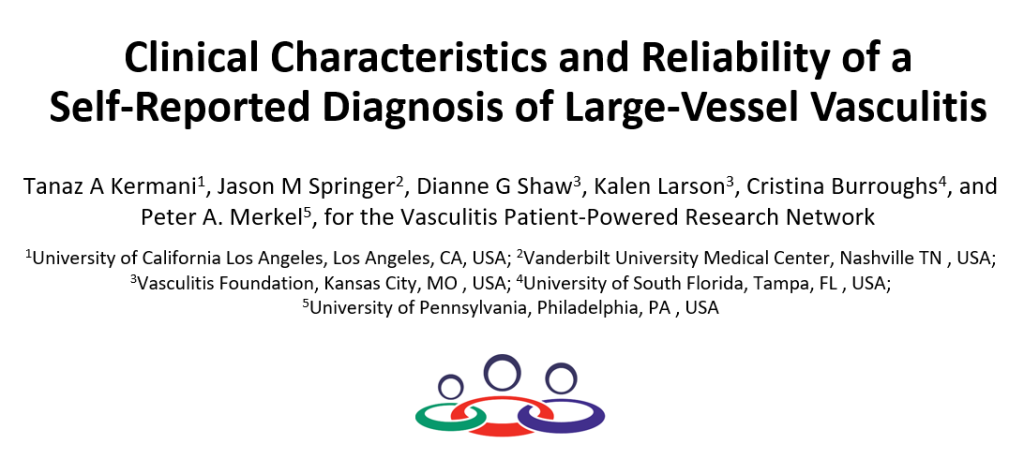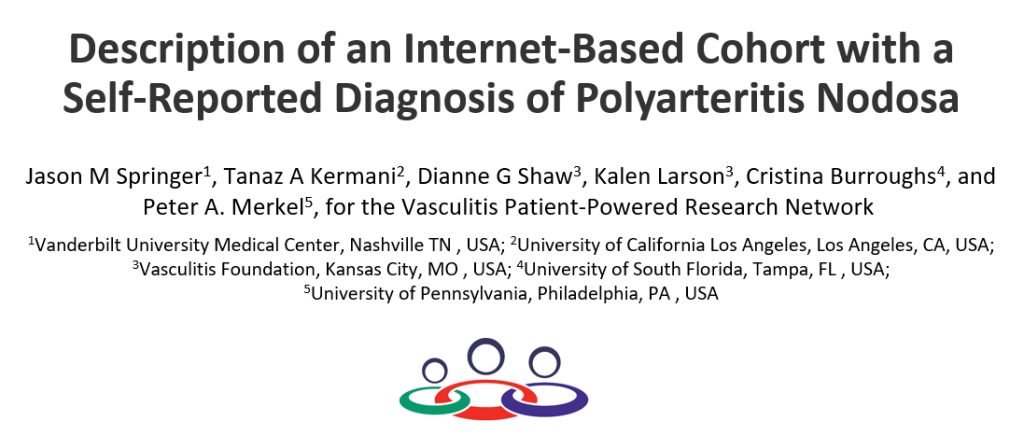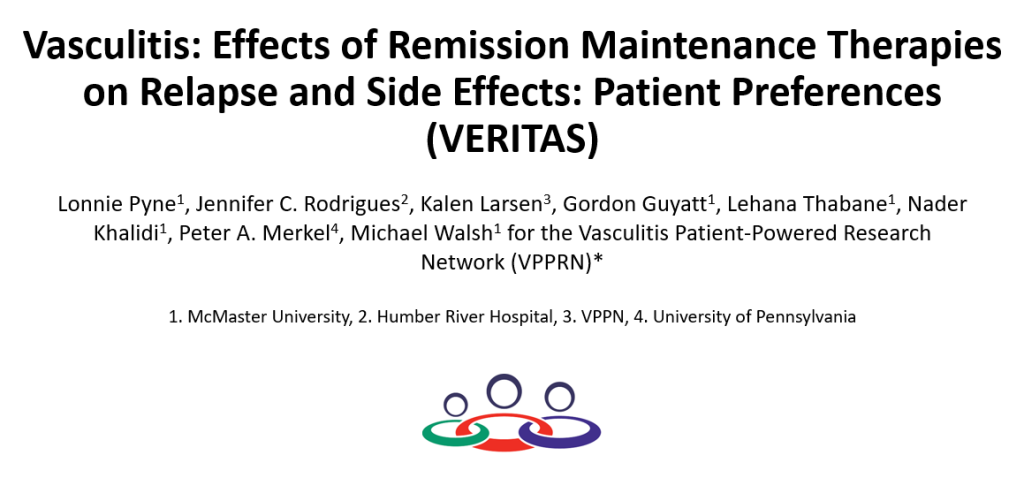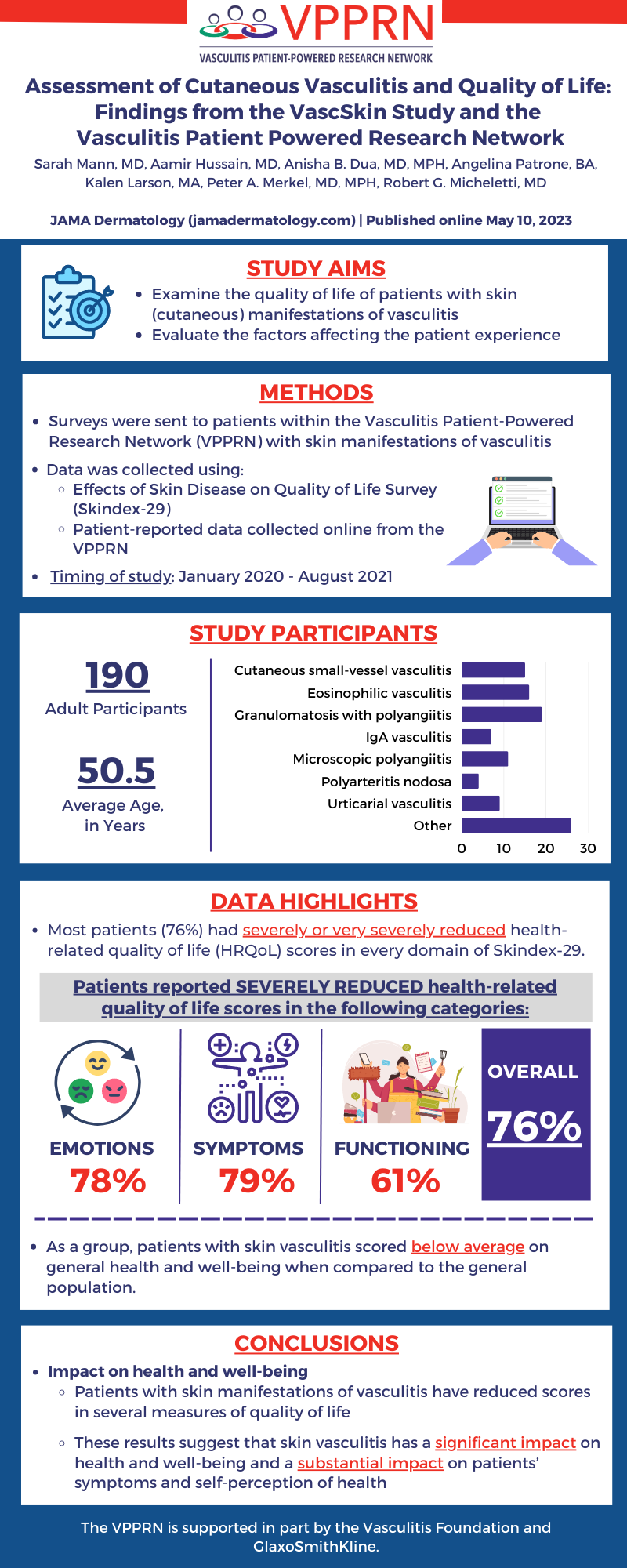VPPRN Patient-Powered Research
VPPRN Research Poster Gallery
The Vasculitis Patient-Powered Research Network (VPPRN) is proud to present this poster gallery to not only showcase the breadth of research of the VPPRN, but the vital role our Network members play in the design and execution of these studies.
In this gallery, you will find an overview of the current research from experts in the field using VPPRN data, and insight from our lead authors as to why the study is important to members of the VPPRN.
It is because of the continued participation and engagement of our VPPRN members that research studies like these are possible.
Data drives research & we cannot do research without our VPPRN members. For that, we thank our Network.
American College of Rheumatology (ACR) Annual Meeting
November 12-14, 2023
VascStrong: Vasculitis Strength Study
Poster #1: The Association of Frailty with Outcomes in Patients with Vasculitis
 The Vasculitis Strength Study (VascStrong) is the first study to assess the frequency and impact of frailty in people living with multiple forms with vasculitis. The study aims to describe the prevalence of common health conditions associated with frailty in patients living with vasculitis and describe its impact on health-related quality of life and clinical outcomes.
The Vasculitis Strength Study (VascStrong) is the first study to assess the frequency and impact of frailty in people living with multiple forms with vasculitis. The study aims to describe the prevalence of common health conditions associated with frailty in patients living with vasculitis and describe its impact on health-related quality of life and clinical outcomes.
Frailty, a condition characterized by an increased vulnerability to poor health outcomes such as hospitalizations and infections, is common in people living with vasculitis. Frailty is associated with an increased risk of hospitalizations, infections, and flares of disease, as well as worse health-related quality of life.
This study, also known as the Vasculitis Strength Study (VascStrong), is the first study to assess the frequency and impact of frailty in people living with multiple forms with vasculitis. The study aims to describe the prevalence of common health conditions associated with frailty in patients living with vasculitis and describe its impact on health-related quality of life and clinical outcomes.
In round 1 of this study (October 8, 2021-January 15, 2022), we found that self-reported frailty or pre-frailty was prevalent in the majority of patients with vasculitis and was associated with worse health-related quality of life.
In round 2 of this study, at the 1-year follow-up with round 1 participants, we evaluated the association of adverse health outcomes and patient-reported outcomes with self-reported frailty and identified changes in frailty status over time.
328 members of the VPPRN participated in Round 1 of this study. 272 from this cohort participated in the follow-up survey (82.9%). All forms of vasculitis were represented.
- At the 1-year follow-up, self-reported frailty or pre-frailty remained prevalent in patients with vasculitis.
- Patients with self-reported frailty or pre-frailty were at higher risk for adverse health outcomes.
- Although most participants were classified at the 1-year follow-up similarly to their baseline frailty status, changes in frailty did occur in a subset of patients.
- Our results highlight the importance of incorporating frailty in the care of individuals living with vasculitis, and the need to design interventions focused on ameliorating frailty, which is achievable in a subset of patients.
This research was conducted through the VPPRN and demonstrates the efficiency and power of working with an engaged group of patients to advance research. The project team included a VPPRN Patient Research Partner (John Stadler) who played a vital role in the design of the survey and interpretation of the results.
The findings from this research study are a direct result of the participation, engagement, and health information provided by members of the VPPRN.
SleepVasc: Quality of Sleep Study
Poster #2: Sleep Disturbances in Patients with Vasculitis: Results of the VPPRN SleepVasc Study
 Patients living with vasculitis often complain of difficulty with sleep and fatigue. The VPPRN Quality of Sleep in Vasculitis Research Study (SleepVasc) aims to learn more about sleep and fatigue in patients living with vasculitis. By understanding factors contributing to both good and poor sleep habits, we may learn how to decrease adverse effects linked to poor sleep and identify ways to improve overall quality of life.
Patients living with vasculitis often complain of difficulty with sleep and fatigue. The VPPRN Quality of Sleep in Vasculitis Research Study (SleepVasc) aims to learn more about sleep and fatigue in patients living with vasculitis. By understanding factors contributing to both good and poor sleep habits, we may learn how to decrease adverse effects linked to poor sleep and identify ways to improve overall quality of life.
Good sleep is critical for maintaining a high quality of life. People who are sleep deprived have an increased risk of serious medical conditions like heart disease and mental illness.
Patients living with vasculitis often complain of difficulty with sleep and fatigue. Fatigue may lead to decreased energy, irritability, and problems focusing. All of these have negative effects on quality of life and physical and mental health.
The aim of this VPPRN study was to learn more about sleep and fatigue in patients living with vasculitis. By understanding factors contributing to both good and poor sleep habits, we may learn how to decrease adverse effects linked to poor sleep and identify ways to improve overall quality of life.
More than 1,000 members in the VPPRN participated in this study. All forms of vasculitis were represented.
- We found that most patients (~80%) with vasculitis experience sleep disturbances that affect their daily function.
- Patients on higher doses of prednisone appear to be at a higher risk of sleep disturbances.
- Future work will explore potential causes of sleep disturbances in vasculitis patient in order to identify ways to help patients get better sleep and improve quality of life.
This research was conducted completely through the VPPRN and demonstrates the importance of the data we collect. The project team included a VPPRN Patient Research Partner (Molly Mason) who was helpful in the design of the survey, marketing and promotion, and interpretation of the results.
The findings from this research study are a direct result of the participation, engagement, and health information provided by members of the VPPRN.
VPREG: Vasculitis in Pregnancy Registry
Poster #3: Reproductive Outcomes for Women with Vasculitis
 There are limited data on reproductive outcomes in patients with vasculitis. To better understand the relationship between vasculitis and pregnancy, the Vasculitis Pregnancy Registry (VPREG) was developed to answer the question: how does vasculitis impact reproductive health. VPREG is an online, patient-driven, global, prospective pregnancy registry designed to collect observational data to increase our understanding of pregnancies in people living with vasculitis.
There are limited data on reproductive outcomes in patients with vasculitis. To better understand the relationship between vasculitis and pregnancy, the Vasculitis Pregnancy Registry (VPREG) was developed to answer the question: how does vasculitis impact reproductive health. VPREG is an online, patient-driven, global, prospective pregnancy registry designed to collect observational data to increase our understanding of pregnancies in people living with vasculitis.
Patients and medical professionals have limited information to make important decisions about pregnancy in vasculitis. Limited data exists on reproductive outcomes in patients with vasculitis.
The Vasculitis Pregnancy Registry (VPREG) is an online, patient-driven, global, prospective pregnancy registry designed to collect observational data to increase our understanding of pregnancies in people living with vasculitis. This study aims to answer the question: how does vasculitis impact reproductive health.
Analysis of the data submitted by participants registered in VPREG is presented here.
147 women enrolled in VPREG participated this study. Most forms of vasculitis were represented.
- Most women gave birth to healthy babies by vaginal delivery at full term (> 37 weeks gestation).
- Most patients did not require hospitalization for their vasculitis during pregnancy.
- Most women reported preserved wellness and low pain during pregnancy.
- This information can be used to inform decisions about reproductive health in vasculitis.
VPREG is an ongoing research study conducted completely through the VPPRN and demonstrates the efficiency and power of working with an engaged group of patients to advance research. The project team includes a VPPRN Patient Research Partner (Heather), a 2-time participant of the VPREG study. She provides her unique insight and perspective in the study development, growth and enhancement, promotion, and interpretation of the data results.
The findings from this research study are a direct result of the participation, engagement, and health information provided by members of the VPPRN and patients eager to share their pregnancy journey with the VPREG Study Team to advance research in vasculitis.
VPREG: Vasculitis in Pregnancy Registry
Poster #4: Exploring Reproductive Experiences with Women Enrolled in VPREG
 There are limited data on reproductive outcomes in patients with vasculitis. To better understand the relationship between vasculitis and pregnancy, the Vasculitis Pregnancy Registry (VPREG) was developed to answer the question: how does vasculitis impact reproductive health. VPREG is an online, patient-driven, global, prospective pregnancy registry designed to collect observational data to increase our understanding of pregnancies in people living with vasculitis.
There are limited data on reproductive outcomes in patients with vasculitis. To better understand the relationship between vasculitis and pregnancy, the Vasculitis Pregnancy Registry (VPREG) was developed to answer the question: how does vasculitis impact reproductive health. VPREG is an online, patient-driven, global, prospective pregnancy registry designed to collect observational data to increase our understanding of pregnancies in people living with vasculitis.
Patients and medical professionals have limited information to make important decisions about pregnancy in vasculitis. Limited data exists on reproductive outcomes in patients with vasculitis.
The Vasculitis Pregnancy Registry (VPREG) is an online, patient-driven, global, prospective pregnancy registry designed to collect observational data to increase our understanding of pregnancies in people living with vasculitis. This study aims to answer the question: how does vasculitis impact reproductive health.
Eighteen women enrolled in VPREG agreed to participate an hour-long interview discussing their experiences with pregnancy. Their feedback are presented here.
18 women enrolled in VPREG participated this study. Anti-neutrophil cytoplasmic antibody (ANCA)-associated vasculitis was the most reported vasculitis diagnosis followed by Takayasu’s arteritis and Behçet’s disease.
- Four major themes identified during these interviews demonstrate common experiences among these women:
- Women sought information about pregnancy from many sources (family, physicians, online resources).
- Most women with vasculitis had successful pregnancies.
- Women relied on conversations with family and physicians to decide about medications for vasculitis during pregnancy.
- Women used self-advocacy during pregnancy to optimize communication between medical providers.
- This study provides insight into the reproductive journeys of women with vasculitis.
VPREG is an ongoing research study conducted completely through the VPPRN and demonstrates the efficiency and power of working with an engaged group of patients to advance research. The project team includes a VPPRN Patient Research Partner (Heather), a 2-time participant of the VPREG study. She provides her unique insight and perspective in the study development, growth and enhancement, promotion, and interpretation of the data results.
The findings from this research study are a direct result of the participation, engagement, and health information provided by members of the VPPRN and patients eager to share their pregnancy journey with the VPREG Study Team to advance research in vasculitis.
American College of Rheumatology (ACR) Annual Meeting
November 12-14, 2022
VascStrong: Vasculitis Strength Study
Poster #1: The Association of Frailty with Outcomes in Patients with Vasculitis
 Due to age or our chronic health conditions, some people experience a physiological decline, a decrease in the ability to “bounce back” from stressors. This change can lead to increased vulnerability to adverse health outcomes. In the medical literature, this process is called frailty.
Due to age or our chronic health conditions, some people experience a physiological decline, a decrease in the ability to “bounce back” from stressors. This change can lead to increased vulnerability to adverse health outcomes. In the medical literature, this process is called frailty.
This study, also known as the Vasculitis Strength Study (VascStrong), aims to describe the prevalence of common health conditions associated with frailty in patients living with vasculitis and describe its impact on health-related quality of life and clinical outcomes. As part of round 1 of this study, we describe the prevalence and factors associated with self-reported frailty in patients with vasculitis.
Frailty was measured using the FRAIL scale, a self-report measure which queries on 5 domains: (1) Fatigue, (2) Resistance, (3) Ambulation, (4) Illnesses, and (5) Loss of Weight.
- Overall, 21.6% and 42.1% classified as frail and pre-frail, respectively.
- Among the individual FRAIL domains, fatigue and resistance were the most frequent, while illnesses were the least common.
Self-reported frailty or pre-frailty is prevalent in the majority of patients with multiple forms with vasculitis and is associated with worse health-related quality of life.
Identifying factors affecting frailty trajectories and outcomes could inform development of interventions focused on ameliorating frailty in patients with vasculitis.
This research was conducted through the VPPRN and demonstrates the efficiency and power of working with an engaged group of patients to advance research. The project team included a VPPRN Patient Research Partner (John Stadler) who played a vital role in the design of the survey and interpretation of the results.
The findings from this research study are a direct result of the participation, engagement, and health information provided by members of the VPPRN.
Vasculitis Diagnostic Validation Studies
Poster #2: Characteristics of Patients with Self-Reported Diagnosis of Urticarial Vasculitis
 Urticarial vasculitis (UV) is a rare disease (annual incidence of < 1 per million) and as such, difficult to do traditional center-based research.
Urticarial vasculitis (UV) is a rare disease (annual incidence of < 1 per million) and as such, difficult to do traditional center-based research.
Patient participation in research is important but research studies are often not accessible to patients who do not live near a study center. The Vasculitis Patient-Powered Research Network (VPPRN) allows participation by patients with vasculitis from across the world; however, it is important to ensure that the data being collected by the VPPRN is of high quality.
The aim of this study is to describe and validate the patient-reported data within the VPPRN for UV. This project is part of a larger effort to validate the data within the VPPRN for each type of vasculitis.
This study evaluated data provided by patients in the VPPRN with Urticarial Vasculitis and found that the signs and symptoms of disease, biopsy and blood test results, and treatments are similar to what has been reported in studies in which data were collected by physician researchers through in-person visits.
These results are quite important and highlight that the VPPRN online registry provides a feasible and cost-effective method of conducting research by directly engaging patients.
This research was conducted completely through the VPPRN and demonstrates the importance of the data we collect. The project team included a VPPRN Patient Research Partner (Dianne G. Shaw) who was helpful in the design of the survey and interpretation of the results.
The findings from this research study are a direct result of the participation, engagement, and health information provided by members of the VPPRN.
VascSkin: Skin Vasculitis Quality of Life Survey
Data results from this VPPRN study have been published!
Skin involvement caused by vasculitis can be painful, burning, itching, and visible to others. Their impact on quality of life and well-being can be serious and is poorly understood by direct care providers.
Dr. Robert Micheletti, assistant professor of dermatology at the Hospital of the University of Pennsylvania, in partnership with the Vasculitis Patient-Powered Research Network (VPPRN), launched the VascSkin Study to better understand the impact of vasculitis-related skin involvement on patients’ quality of life.
190 adult patients in the VPPRN participated in this study. Based on the data collected using the Effects of Skin Disease on Quality of Life Survey (Skindex-29) and patient-reported data collected online from the VPPRN, we found that patients with skin manifestations of vasculitis have reduced scores in several measures of quality of life. These results suggest that skin vasculitis has a significant impact on health and well-being and a substantial impact on patients’ symptoms and self-perception of health.
Past VPPRN Research Posters
Annual International Vasculitis Foundation Symposium | July 16, 2022
Guided Tour of the Poster Gallery
Watch Michael Putman, MD, MSCI from the Medical College of Wisconsin on this tour! He leads us through the gallery by providing an overview of the posters and discussing the impact of Network member engagement in the research of the Vasculitis Patient-Powered Research Network.
 STUDY AIM:
STUDY AIM:
To compare the clinical characteristics and determine the reliability of a self-reported diagnosis of giant cell arteritis (GCA) or Takayasu’s arteritis (TAK) in an international, internet-based cohort.
 STUDY AIM:
STUDY AIM:
Describe an internet-based cohort of participants with a self-reported diagnosis of PAN and determine how many met established criteria for PAN.
 STUDY AIM:
STUDY AIM:
Relapses are common in vasculitis and preventing relapses is a goal of treatment. It is unknown to what degree patients value relapse avoidance and how much risk they are willing to accept to avoid relapses. With patient partners we designed, piloted, and administered a survey called the Vasculitis: Effects of Remission Maintenance Therapy on Relapse and Side Effects: Patient Preferences (VERITAS).
Plasma Exchange for ANCA-Associated Vasculitis: An International Survey of Patient Preferences
Data results from this VPPRN study have been published!
This research study focused on patient values and preferences regarding plasma exchange (also known and plasmapheresis) as a treatment for ANCA-associated vasculitis. We found there was considerable variability in patients’ choices: 1/3 of respondents chose plasma exchange regardless of risk, 1/5 of respondents chose PLEX but only at higher risks, and 1/6 of respondents declined plasma exchange under any situation. Predictors of choosing treatment with plasma exchange were previous treatment with dialysis, previous treatment with plasma exchange, risk of kidney failure or serious infection, and country. Our findings show that there is a need to engage in shared decision-making between patients and physicians when considering plasma exchange in ANCA-associated vasculitis including for patients at both high and low risk of kidney failure.
An International Delphi Exercise to Identify Items of Importance for Measuring Response to Treatment in ANCA-Associated Vasculitis
Data results from this VPPRN study have been published!
The purpose of this research project was to evaluate which measures are considered by patients and physicians to be most important when assessing response to treatment in ANCA-associated vasculitis. Patient participation and recruitment through the Vasculitis Patient-Powered Research Network (VPPRN) was critical to the success of this project. We found that while there was consensus between physicians and patients on many items, patients and physicians also differed on some areas. This study was important because these results directly informed the next steps in the development of new response criteria for use in clinical trials in ANCA-associated vasculitis.
Medication Interruptions and Subsequent Disease Flares During the COVID-19 Pandemic: A Longitudinal Online Study of Patients with Rheumatic Disease
Data results from this VPPRN study have been published!
Using the Vasculitis Patient-Powered Research Network (VPPRN) and partnering organizations, we received data from patients with vasculitis who completed baseline surveys between March 29 and June 30, 2020 and at least one follow-up survey through May 2021. We found that patients with vasculitis had high levels of anxiety at the start of the pandemic, but anxiety decreased close to general population averages by May of 2021. Our research showed that interruptions in medication use increased in 2021, but were more commonly recommended by physicians and may have been related to interruptions occurring around the time of vaccination. A substantial proportion of interruptions in medication use was not recommended by physicians, however, highlighting the importance of regular communication between the patients and the healthcare team during public health crises to ensure optimal use of medications.
VascSkin: Skin Vasculitis Quality of Life Survey
Data results from this VPPRN study have been published!
Skin involvement caused by vasculitis can be painful, burning, itching, and visible to others. Their impact on quality of life and well-being can be serious and is poorly understood by direct care providers.
Dr. Robert Micheletti, assistant professor of dermatology at the Hospital of the University of Pennsylvania, in partnership with the Vasculitis Patient-Powered Research Network (VPPRN), launched the VascSkin Study to better understand the impact of vasculitis-related skin involvement on patients’ quality of life.
190 adult patients in the VPPRN participated in this study. Based on the data collected using the Effects of Skin Disease on Quality of Life Survey (Skindex-29) and patient-reported data collected online from the VPPRN, we found that patients with skin manifestations of vasculitis have reduced scores in several measures of quality of life. These results suggest that skin vasculitis has a significant impact on health and well-being and a substantial impact on patients’ symptoms and self-perception of health.
View Full Poster
Read Full Article
Role of the VPPRN and Lead Author Bio



